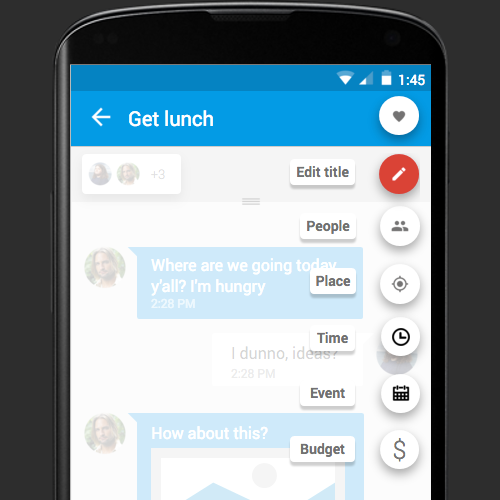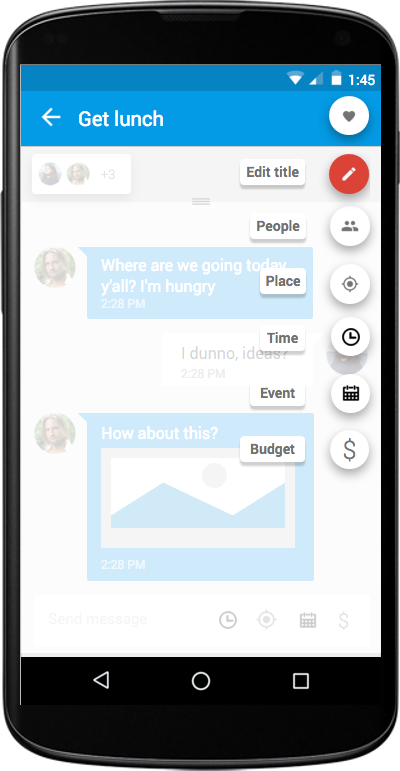| Client: | |
| Dates: | April 2016 |
| Skills/Subjects: | Axure, interaction design, mobile, prototyping, research, UI design |
| URL: | http://xl717d.axshare.com/#p=home |
Background
This roughly six-hour project was done as an individual interview exercise for Google’s designers to see how I approach certain design problems., using whatever process I would like. Of three prompts, I chose their “party assistant” prompt asking how to make ad-hoc event coordination and individual assistance for attendees to be convenient and comfortable.
This technology (and probably similar designs) is something that can be used in many contexts, not just as a party assistant. Generally put, it’s a distributed knowledge network focused on a finite set of states with the goal of a single state that may change with minimal loss of agreement among parties. It’d probably sell well as a party assistant, but from a cursory literature review, it could probably be very valuable to inter-company communications and for knowledge dissemination goals like what the Bill & Melinda Gates Foundation does. This looked like a good chance to work on one and multiple things simultaneously. A good use of the three to five hours the Google recruiter suggested!
In that time, Google requested that I design a low fidelity overview of the app and a high fidelity mockup of at least one screen. Even for a design exercise, I feel uncomfortable if I don’t do research first. So I spent a couple hours on that and then moved on to the interaction design:
- Start this high level list (10 minutes)
- Pick a prompt (20 minutes)
- Why does Google want a party assistant? (15 minutes)
- Who’s already doing this? (1 hour, 45 minutes)
- Target groups
- How will Google be most competitive? (20 minutes)
- Find something unexpected
- Horizontal lofi (2.5 hours)
- Outcomes matrix
- Sketch user journey
- Single touchpoint hifi of 7a (1 hour)
Total time: 6 hours, 20 minutes
Why would Google want a party assistant?
As pitched, Google implies something convenience and comfort as important, comparing it to a daily routine, which other Google services can definitely provide access to. if the generic version of the party assistant is involving some number of people in the process of converging on a state, this could be considered persuasive and collaborative technology.
Google’s Location History service can be used to provide location associations to other data, including user notes on Keep, timely information for buses, alerts to kidnappings, sales and deals at stores, and other opportunities for monetization. Google is a company based on selling data and ads, so that’s why they’d want location info. If that can be used persuasively, that could lead to more confidence in converting ad occurrence to ad engagements, making each unit of ad sales more valuable as well as a service if provided by Google for making this conversion. But being persuaded is not a comfortable experience, so that should be mediated by user’s preferences (inferred and user-set). In addition, if it’s collaborative, then it can be more convenient since highly active group participants can do more work than the less active participants. It also makes gathering and sharing data associations more convenient for Google. But it’s less convenient for Google, since these people may be planning a big event with lots of different sorts of data (locations, times, foods, favorite games, notes, animals, memes, videos, etc). So that would require lots of processing work.
Who’s already doing this?
What are some existing “party assistants”?
- Myke (not released yet): focused on discovering other people’s parties, signing up, and getting a group together. Satisfies a lot of what Google wants, but doesn’t seem to be convenient and relies on users really knowing and using this platform.
- Target group: concert-goers with friends
- Emble (closed release): focuses on choosing something to do, when to do it, who to do it with, and finalizing a plan. You can even start pitching in money for a budget. Assumes a central planner and involves others just for ideas and messaging. It’s also meant for a large screen.
- Target group: friends planning something significant, plans with budgets
- Humans (on the market for some millennia): pretty good at handling social matters, need some tech help to manage scale, especially for non-social matters
- Target group: relatively wealthy people, businesses
What are some existing collaborative event assistants?
- Who’s Down (closed release): one person suggests an event (shortly described, like “get lunch”) at a time (seems to be immediately) and people opt in. There’s also a messaging feature. Very simple and convenient, seems comfortable to use.
- Target group: friends just wanting to decide on something simple
- Biletu (closed beta): provides a few options for searching communities for events, including Facebook and their own community, finding out what others are doing (similar to Who’s Down), chatting with people, and setting some basic details for an event (like Facebook events). Also has budgeting. This seems to be the most robust one out there.
- Target groups: social media friends who look for new things to do in their area
- Calendars (everywhere): these are focused on the time of events with some basic handling for details, not great for robust planning criteria
- Target groups: people with many commitments, time managers
- Messaging apps: whether they’re based on social networks, personal contact lists, or within other apps, people can create ad-hoc groups to plan an event the old fashioned way.
- Target group: friends (at least on the app) with subgroups for different events
How will Google be most competitive?
MIT Sloan Management Review published in 2013 a guide to designing effective knowledge networks, or collections of heterogeneous stakeholders to invent and share knowledge. Without getting into the delineations of data, knowledge, truth, and information, knowledge in the sense of a party planning app means “I heard about this thing happening this weekend,” and “I saw my friend was going to an event.” Of the four common network goals the article described, coordination and supporting individual members is of most importance to this product.
Following their framework, this application would be effective at helping some friends figure out what to do by providing a well designed set of conditions the participants can agree on and feedback loops to sustain the dynamic interactions of participating in an event.
Looking to some of my friends, I found that most of them use group chats in messaging app to do ad hoc event planning and coordination. Not getting into a full task analysis, suffice to say that they use a litany of other apps and services and websites along the way, but all the information worth sharing goes into the messaging app. This leaves a lot of people out of the loop if they miss the opportunity to weigh in at critical decision points, and if it’s a very busy thread some information may be buried for infrequent readers.
Considering Who’s Down is already out there, we can build off of that and Hangouts to combine many of the features in other services. Compared to Biletu, though, Google could use some web feed aggregation to compete there. Services like Places, Directions, Maps, Location History, Calendar, Search History, and third-party applications like Facebook and other social media for specific interests would make for a more robust service design than anything else.
HORIZONTAL PROTOTYPE
| Outcomes matrix | |||
| Target Group | Group leaders
(transient member role) |
Group members
(all with access) |
Attendees
(subgroup of members) |
| What matters? | Finding options, suggesting options, guiding to a decision | Getting notified that something is happening, getting and making suggestions, deciding on a time and place | Confirming details, sharing locations and minute-by-minute updates before meeting in person, sharing photos and other event artifacts |
| Feature 1 | Access, filter, and sort events by own criteria | Get notified when, and seeing in one place, any group is planning something | Get quick access to details and notifications of changes |
| Outcome 1 | Find an event you’d like | Know friends are planning something you can join and get clues to whether you can invite friends from other groups | Sanity check details so you’re never out of the loop or miss updates |
| Measure 1 | Actions on suggested events vs other sources of events | Awareness of friend’s events and perceived ability to participate in planning | Time to access and make sense of details and updates |
| Feature 2 | Highlight events by group member criteria | Filtering, sorting, deciding on suggestions | Send updates on user’s status or discuss details with other attendees |
| Outcome 2 | Find and suggest an event your friends will join | Get friends to do what you want to do | Make sure nobody else is out of the loop or leaves you out when something changes |
| Measure 2 | More consistent or higher attendance to top suggestions | Final decision compared to user-defined priority/interest | (self) perceived ability to share status. (others) inverse of measure 1 |
See my lo-fi walkthrough of sketches for these features and my high fidelity Axure prototype (or download it).

